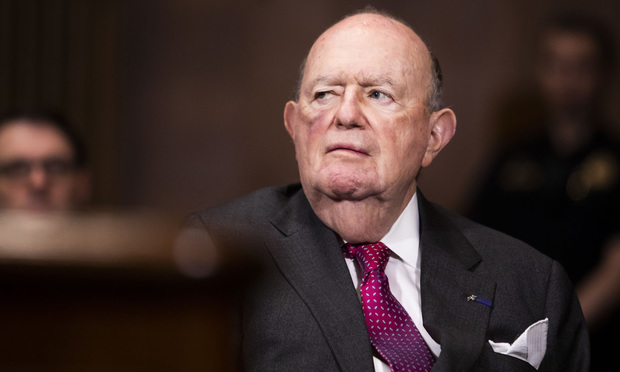DC Circuit Rejects Trump's Blanket Ban on Immigrant Minors' Abortions
The U.S. government's position could not "be squared" with U.S. Supreme Court decisions, according to panel members judges Sri Srinivasan, Robert Wilkins and Laurence Silberman.
June 14, 2019 at 11:38 AM
6 minute read
 Judge Robert Wilkins of the District of Columbia Circuit. Credit: Diego M. Radzinschi / NLJ
Judge Robert Wilkins of the District of Columbia Circuit. Credit: Diego M. Radzinschi / NLJ
A three-judge panel of the U.S. Court of Appeals for the D.C. Circuit on Friday unanimously rejected the Trump administration's blanket policy of denying abortion access to unaccompanied minors who are in government custody.
The panel, in a 81-page unsigned opinion, upheld in main part a Washington federal trial judge's preliminary injunction against the policy. The government's position could not “be squared” with U.S. Supreme Court decisions, according to panel members judges Sri Srinivasan, Robert Wilkins and Laurence Silberman.
“To be sure, the 'right to an abortion' is viewed to have a 'controversial nature,' as to which people 'sincerely hold directly opposing views,'” the judges said in their ruling, quoting from Supreme Court decisions. “But the Supreme Court 'has determined and then redetermined that the Constitution offers basic protection to the woman's right to choose.' And we are not free to dilute a constitutional right recognized by controlling Supreme Court precedent—a right the government affirmatively assumes unaccompanied minors here have—so that others will be dissuaded from seeking a better life in this country.”
The panel sent back to the district judge, Tanya Chutkan, another part of the injunction that barred disclosure to parents and others of unaccompanied minors' pregnancies and abortion decisions. “That portion of the preliminary injunction, we conclude, warrants further explication to aid appellate review,” the D.C. Circuit judges said.
Although unanimous in rejecting the government's position barring abortions for unaccompanied minors in U.S. custody, the panel divided 2-1 on certain procedural rulings that the district court had issued. Silberman, writing in his dissent, said he disagreed with the majority's ruling that Chutkan had properly certified the class of minors in the case and that the case was not moot.
 Senior Judge Laurence Silberman, of the U.S. Court of Appeals for the District of Columbia Circuit. Credit: Diego M. Radzinschi/ ALM
Senior Judge Laurence Silberman, of the U.S. Court of Appeals for the District of Columbia Circuit. Credit: Diego M. Radzinschi/ ALM“The crux of my dispute on this issue is that I believe that the class is much too broad; it should not include pregnant minors who do not wish an abortion, whether you refer to that as a violation of commonality, typicality, or adequacy,” Silberman wrote.
Silberman, reflecting on the merits of the case, embraced what he called a “persuasive prior opinion” written by then-Judge Brett Kavanaugh, while he was still on the D.C. Circuit.
In the D.C. Circuit, Kavanaugh lauded the government's “permissible interests in favoring fetal life, protecting the best interests of a minor, and refraining from facilitating abortion.” (Kavanaugh, now a Supreme Court justice, would be recused in the event the dispute did reach the high court.)
“I am afraid the majority's refusal to consider narrowing the scope of the district court's order justifies Judge Kavanaugh's accusation that the court is endorsing abortion on demand—at least as far as the federal Government is concerned,” Silberman said Friday.
Wilkins and Srinivasan countered: “But after that [Kavanaugh] opinion, the government at no point asked the district court in the ensuing proceedings to consider crafting a remedy that would give the government some extra time period to find a sponsor upon learning of [an unaccompanied alien child's] interest in an abortion. Nor did the government suggest the contours of any such approach.”
Devising a narrower remedy, Wilkins and Srinivasan, “would have entailed 'making distinctions in a murky constitutional context . . . where line-drawing is inherently complex' and is laden with the kinds of policy judgments a court typically does not make on its own.”
In 2017, the Trump administration instituted a policy essentially barring any unaccompanied minor, under the age of 18, in its custody from obtaining a previability abortion.
The policy blocked abortion even if the minor met all requirements for one under state law, including a showing she is mature enough to make that decision, and even if she secured her own funding and transportation for the procedure. There is no exception if the pregnancy results from rape. Anyone age 18 or older in immigration custody is allowed to terminate her pregnancy.
Brigitte Amiri of the American Civil Liberties Union argued on behalf of the class. U.S. Justice Department special counsel August Flentje represented the government.
Arguing in the D.C. Circuit, Flentje denied the policy created an undue burden on immigrant minors. “The burden is created by the minor crossing illegally—not by the government,” Flentje told the panel. “When the person is able to choose to go back to her country of nationality, there is no undue burden imposed by the government.”
Amiri argued in support of Chutkan's rulings that established the injunction and approval of class certification.
“The government has operated a policy of banning abortion for all unaccompanied immigrant minors while in custody,” she told the appeals panel. “It is rare to see such a stark prohibition on abortion. This is a blanket ban on abortion for anyone while in custody, which is blatantly unconstitutional under Roe [v. Wade] and it progeny.”
The D.C. Circuit's ruling in J.D. v. Azar is posted below.
Read more:
The Justices Had 5 Votes to Overturn 'Roe' in 1992. Why That Didn't Happen.
How a Trump-Appointed Judge's Recusal Sped Up Indiana's Anti-Abortion Challenge
Why Roberts Sided With Liberals Blocking Restrictive Louisiana Abortion Law
'There Is This Battle Over the Language' in Abortion Clashes
Justice Thomas Accuses Colleagues of Sidestepping Abortion-Related Disputes
DC Circuit's Millett, Who Backed Teen's Abortion Right, Finds Role Model in RBG
This content has been archived. It is available through our partners, LexisNexis® and Bloomberg Law.
To view this content, please continue to their sites.
Not a Lexis Subscriber?
Subscribe Now
Not a Bloomberg Law Subscriber?
Subscribe Now
NOT FOR REPRINT
© 2025 ALM Global, LLC, All Rights Reserved. Request academic re-use from www.copyright.com. All other uses, submit a request to [email protected]. For more information visit Asset & Logo Licensing.
You Might Like
View All
GOP Now Holds FTC Gavel, but Dems Signal They'll Be a Rowdy Minority
6 minute read
DC Lawsuits Seek to Prevent Mass Firings and Public Naming of FBI Agents
3 minute read

Fired by Trump, EEOC's First Blind GC Lands at Nonprofit Targeting Abuses of Power
3 minute readTrending Stories
- 1Fired NLRB Member Seeks Reinstatement, Challenges President's Removal Power
- 2NY Inspector General Announces Attorneys Hired to Lead Upstate Region and Gaming
- 3Carol-Lisa Phillips to Rise to Broward Chief Judge as Jack Tuter Weighs Next Move
- 4Data Breaches in UK Legal Sector Surge, According to ICO Data
- 5Georgia Law Schools Seeing 24% More Applicants This Year
Who Got The Work
J. Brugh Lower of Gibbons has entered an appearance for industrial equipment supplier Devco Corporation in a pending trademark infringement lawsuit. The suit, accusing the defendant of selling knock-off Graco products, was filed Dec. 18 in New Jersey District Court by Rivkin Radler on behalf of Graco Inc. and Graco Minnesota. The case, assigned to U.S. District Judge Zahid N. Quraishi, is 3:24-cv-11294, Graco Inc. et al v. Devco Corporation.
Who Got The Work
Rebecca Maller-Stein and Kent A. Yalowitz of Arnold & Porter Kaye Scholer have entered their appearances for Hanaco Venture Capital and its executives, Lior Prosor and David Frankel, in a pending securities lawsuit. The action, filed on Dec. 24 in New York Southern District Court by Zell, Aron & Co. on behalf of Goldeneye Advisors, accuses the defendants of negligently and fraudulently managing the plaintiff's $1 million investment. The case, assigned to U.S. District Judge Vernon S. Broderick, is 1:24-cv-09918, Goldeneye Advisors, LLC v. Hanaco Venture Capital, Ltd. et al.
Who Got The Work
Attorneys from A&O Shearman has stepped in as defense counsel for Toronto-Dominion Bank and other defendants in a pending securities class action. The suit, filed Dec. 11 in New York Southern District Court by Bleichmar Fonti & Auld, accuses the defendants of concealing the bank's 'pervasive' deficiencies in regards to its compliance with the Bank Secrecy Act and the quality of its anti-money laundering controls. The case, assigned to U.S. District Judge Arun Subramanian, is 1:24-cv-09445, Gonzalez v. The Toronto-Dominion Bank et al.
Who Got The Work
Crown Castle International, a Pennsylvania company providing shared communications infrastructure, has turned to Luke D. Wolf of Gordon Rees Scully Mansukhani to fend off a pending breach-of-contract lawsuit. The court action, filed Nov. 25 in Michigan Eastern District Court by Hooper Hathaway PC on behalf of The Town Residences LLC, accuses Crown Castle of failing to transfer approximately $30,000 in utility payments from T-Mobile in breach of a roof-top lease and assignment agreement. The case, assigned to U.S. District Judge Susan K. Declercq, is 2:24-cv-13131, The Town Residences LLC v. T-Mobile US, Inc. et al.
Who Got The Work
Wilfred P. Coronato and Daniel M. Schwartz of McCarter & English have stepped in as defense counsel to Electrolux Home Products Inc. in a pending product liability lawsuit. The court action, filed Nov. 26 in New York Eastern District Court by Poulos Lopiccolo PC and Nagel Rice LLP on behalf of David Stern, alleges that the defendant's refrigerators’ drawers and shelving repeatedly break and fall apart within months after purchase. The case, assigned to U.S. District Judge Joan M. Azrack, is 2:24-cv-08204, Stern v. Electrolux Home Products, Inc.
Featured Firms
Law Offices of Gary Martin Hays & Associates, P.C.
(470) 294-1674
Law Offices of Mark E. Salomone
(857) 444-6468
Smith & Hassler
(713) 739-1250








